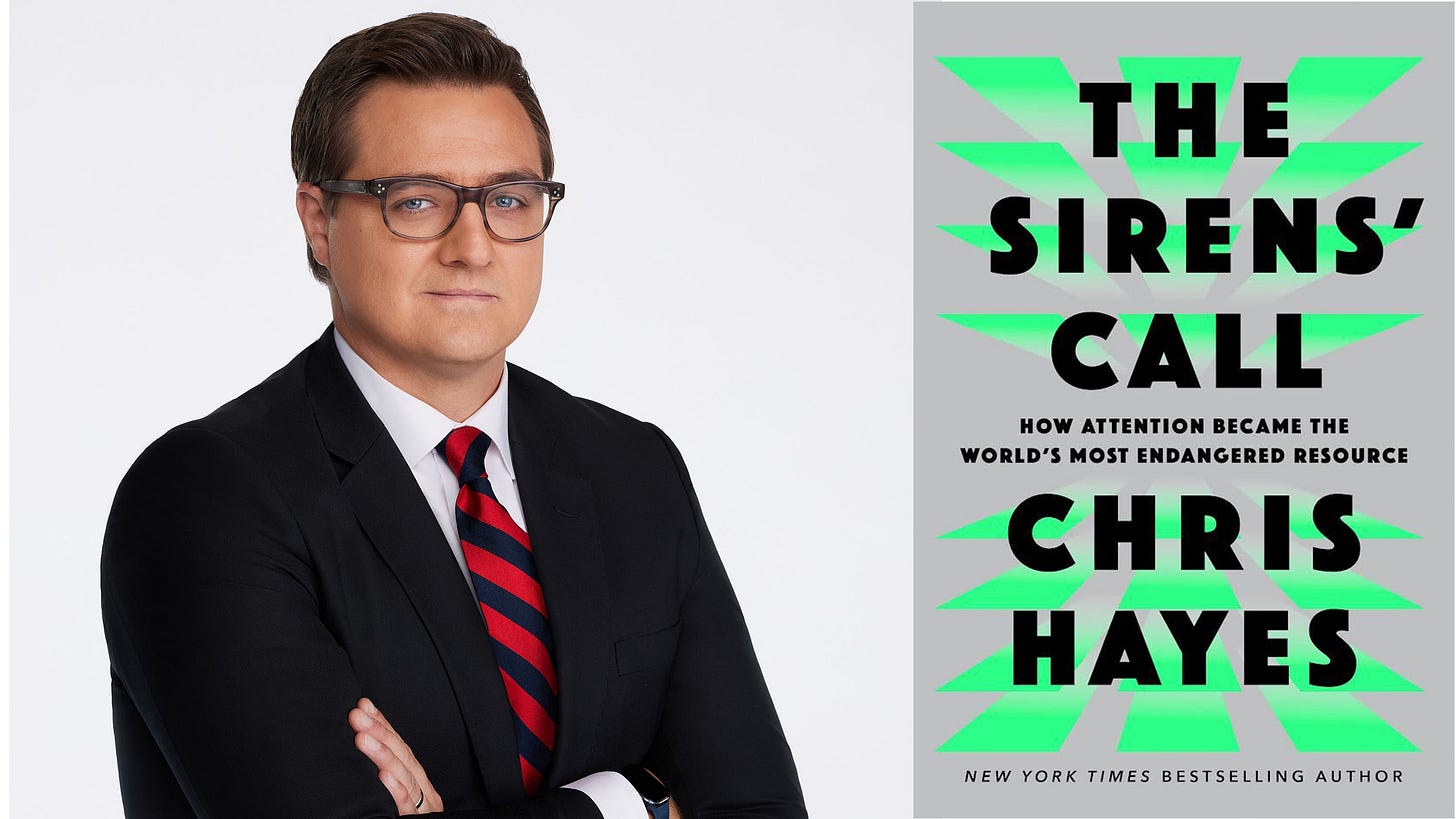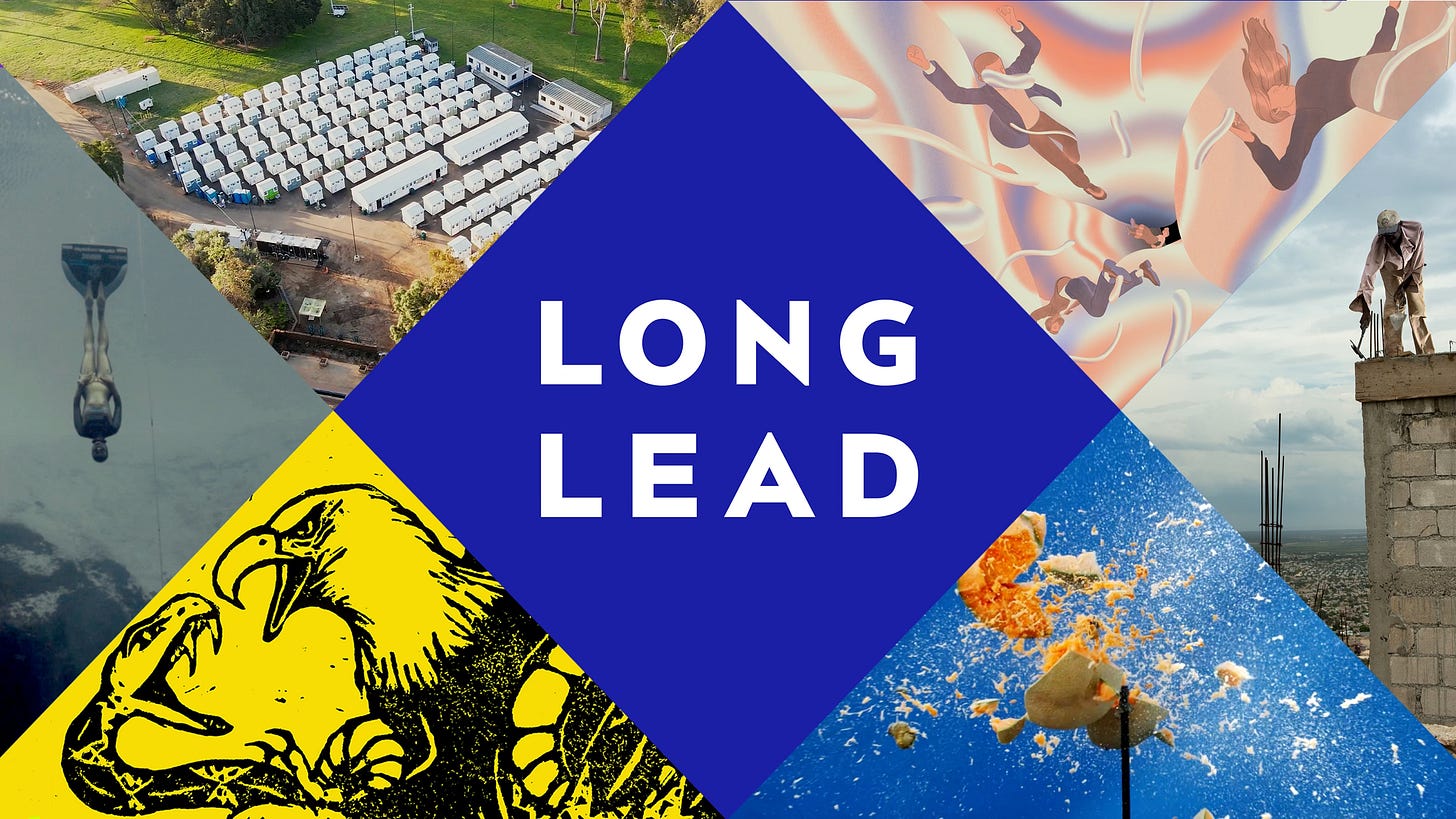MSNBC’s Chris Hayes wants your attention, please
The newscaster’s new book, 'The Sirens’ Call,' grapples with how distracted technology has made us all. Put your phone down and read it.
Chris Hayes, the host of MSNBC’s weeknight news and opinion show All In With Chris Hayes, has been contemplating the subject of attention for a very long time. “I’ve had to think so much about the inherent tension between different imperatives that you might have as a journalist: keeping people’s attention and telling them important stories, which are not always in sync,” says Hayes, who has been with the network for more than 13 years.
The Brooklyn-based newscaster first wrote about the subject of attention for the New Yorker in a 2021 essay entitled “On the Internet, We’re Always Famous.” “I came away from it being like, ‘Oh, I want to write about this more,’” he tells Depth Perception. The result is his new book, The Sirens’ Call: How Attention Became the World’s Most Endangered Resource, which explores how tech — especially what he calls “the attention box” in our pockets — has made so many of us lose focus. He thinks the subject has widespread appeal: “It’s a thing that you can universally complain about, that just sucks about modern life.”
Hayes, who got his start in print journalism, recently spoke to Depth Perception about his book, the state of the media today, and how to deal with the onslaught of distractions in the Trump 2.0 era. Those with short attention spans fear not: The following interview has been condensed and edited for length (and clarity). —Mark Yarm
I’m happy to say that I read your whole book, but I had to put my phone in the other room in order to really focus. When you were writing The Sirens’ Call, how did you imagine people engaging with it given the many distractions we have?
I genuinely worked hard to make it a good read. There’s a lot of technique and craft in there to keep it moving and keep, like, bopping in to take the reader by the hand. There’s a voicy, almost casual tone that I tried to get so that it would be an easy and fun read. At some level, you can't control the insane milieu of distraction that is modern life. But the other thing I will say, bombarded as we are and as distracted as we are, a lot of people read a lot of books, and it’s kind of an amazing thing that that persists.
Given all the distractions that you lay out in the book and the fact that you have a demanding day job, a family, presumably some sort of social life, how did you focus on getting the writing done?
I’ve always been a pretty fast writer. That has been useful for me in cable news, because obviously we work on very short deadlines and we have to produce work every day, so I’m exercising that muscle all the time. My wife likes to joke that I’m the least tortured writer she’s ever met. I really love writing. It’s work, for sure, and it’s hard, but I really do love it, and in some ways — and I write about this in the book — working on a book like this is kind of my own antidote to a lot of the things I’m describing. It forces a kind of discipline and rigor and sustained attention, and a mode of thought that is very hard to achieve without the pressure of a deadline.
“The impulse to find out what’s happening and tell people what’s happening is so elementally human. People want to get to the bottom of things. And I think, in most places, they want to tell the truth.” — Chris Hayes
Given the erosion of attention generally, what do you see as the value of longform journalism these days? And how do you think it might change in the coming years?
I feel totally humble about the future. I just really, truly, to my core, do not know what’s gonna happen. I think it’s a pretty tough spot for journalism right now. In many ways, I think it’s as bad as I’ve seen it in a bunch of ways. There’s the increasing power and co-option of the platforms that turn everything into content, particularly the algorithmic feed as the central way people are getting news, which I think is just a disaster. The slow death, both in market terms and also culturally, of news or journalism, like a separate and distinct entity, is really bad.
But there’s the Jurassic Park quote “Life finds a way.” I do think that you’re already seeing some green shoots. People are trying new things that are working. And I think that people do want true information about the world. It’s a little like people walking around super-smog-filled cities reaching a point where they’re like, “This sucks. I don't like this.”
What are some of the “green shoots” you’re seeing?
I just did a podcast with David Roberts, who has a Substack called Volts, which is a great example. It’s in part about climate, and often very technical, with wonky interviews and coverage of things like the mechanics for distributed systems or improving the grid. It’s really first-rate work that I learn a lot from. It’s encouraging that that can exist. The fact that you’re seeing people who are not just take slingers. And there’s nothing wrong with take slingers — I’m basically a take slinger myself. And you're interviewing me now for a Substack, right? You’re doing real journalism. There’s enough of that going on that it gives me some hope about where all this might go.
Subscribe to Long Lead, journalism without compromise
Long Lead is an award-winning journalism studio focused on finding, financing, producing, and publishing in-depth reporting. We work with veteran independent writers, photographers, filmmakers, and designers to produce best-in-class editorial products. With an eye for ambitious, ground-breaking features, we publish work about any subject, in any medium, anywhere in the world.
Since launching in late 2021, Long Lead has earned more than three dozen major journalistic honors, including SPJ’s Sigma Delta Chi Award for our explainer on less-lethal weapons The People vs. Rubber Bullets, an Edward R. Murrow Award for our podcast Long Shadow, and a prize from the National Press Foundation for our multimedia feature on unhoused veterans Home of the Brave.
Learn more about our journalism, including news about our next feature, by subscribing to the Long Lead newsletter here:
We’re speaking less than a week before Donald Trump’s inauguration. As you write in the book, he is a master of commanding our attention. What advice can you offer to a person who wants to stay engaged with the news but doesn't want to become consumed by the constant barrage of insanity?
In some ways these antiquated notions we had pre-24-hour news cycle had a certain kind of logic to them: Read the paper in the morning, watch the evening news. If you read a newspaper every day, you’re very well-informed. No one should feel guilty about only consuming news once a day. You don’t have to be thinking about the news all day if you’re not in the business.
You also write about Elon Musk, who is constantly spreading disinformation and the like on X. Do you think he’s more or less dangerous than Trump in that regard?
I think now probably more. Ryan Mac and Kate Conger have a really good book called Character Limit. The opening scene is basically a data scientist who seems like a totally competent, earnest dude quitting when Musk comes in, partly because of his Paul Pelosi tweet, which people have forgotten, but it was so disgusting. It intimated that Paul Pelosi was having some secret affair with the pretty clearly disturbed man that broke in and almost crushed his skull and killed him. It’s amazing how much we countenance all this. It’s become sort of part of the room tone.
If you were to give this book to your counterparts at Fox News what do you think they would make of it?
I think they would agree with and relate to a whole bunch of it. I think they would understand the feeling of chasing attention, as opposed to leading — trying to sail the sailboat when the wind’s blowing against you. And then there’s a whole bunch of the book that just has literally nothing to do with politics or public life at all. The way people feel about this is something that’s shared across ideological and partisan lines. It’s probably good for us to meet across those lines of difference on this question.
What else gives you hope for the future of journalism?
I encountered a YouTube video the other day where someone did a forensic examination of Elon Musk’s claims about being a Top 10 gamer in some game whose name I can’t remember. I had never heard of this YouTuber before. It’s a different genre than what I grew up doing, but it was a great piece of journalism. He just did the work, and it got a ton of views.
The impulse to find out what’s happening and tell people what’s happening is so elementally human. People want to get to the bottom of things. And I think, in most places, they want to tell the truth. The question is, do we produce a set of institutions, platforms, a digital sphere, market incentives that cultivate telling the truth? But the human impulse is so elemental there that it gives me hope.
Further reading, viewing, and listening from Chris Hayes
“You’re Being Alienated From Your Own Attention” (The Atlantic, Jan. 22, 2025)
“Chris Hayes: I Want Your Attention. I Need Your Attention. Here Is How I Mastered My Own.” (The New York Times, Jan. 3, 2025)
“On the Internet We’re Always Famous” (The New Yorker, Sept. 24, 2021)
Twilight of the Elites: America After Meritocracy (Crown; originally published 2012)
The Age of Inequality: Corporate America's War on Working People, edited by Jeremy Gantz (Verso, 2017)









He's such a handsome feller, but this picture is too cheesy! Can't wait to read this one. Loved Twilight of the Elites
https://m.youtube.com/watch?v=-tsE6cIcRrM